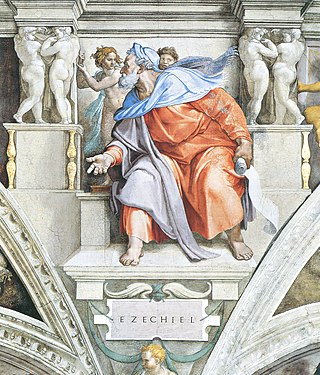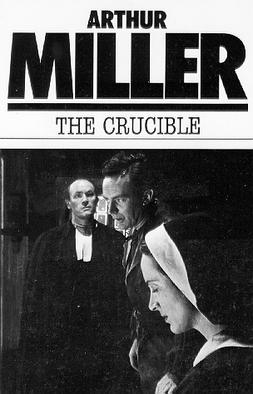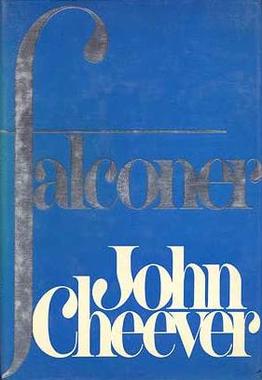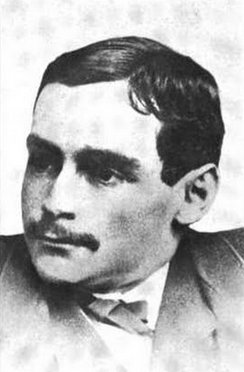Related Research Articles

The Book of Ezekiel is the third of the Latter Prophets in the Tanakh and one of the major prophetic books, following Isaiah and Jeremiah. According to the book itself, it records six visions of the prophet Ezekiel, exiled in Babylon, during the 22 years from 593 to 571 BCE, although it is the product of a long and complex history and does not necessarily preserve the very words of the prophet.

Ezekiel or Ezechiel is the central protagonist of the Book of Ezekiel in the Hebrew Bible.

The Crucible is a 1953 play by American playwright Arthur Miller. It is a dramatized and partially fictionalized story of the Salem witch trials that took place in the Massachusetts Bay Colony during 1692–93. Miller wrote the play as an allegory for McCarthyism, when the United States government persecuted people accused of being communists. Miller was questioned by the House of Representatives' Committee on Un-American Activities in 1956 and convicted of contempt of Congress for refusing to identify others present at meetings he had attended.

John William Cheever was an American short story writer and novelist. He is sometimes called "the Chekhov of the suburbs". His fiction is mostly set in the Upper East Side of Manhattan; the Westchester suburbs; old New England villages based on various South Shore towns around Quincy, Massachusetts, where he was born; and Italy, especially Rome. His short stories included "The Enormous Radio", "Goodbye, My Brother", "The Five-Forty-Eight", "The Country Husband", and "The Swimmer", and he also wrote five novels: The Wapshot Chronicle , The Wapshot Scandal, Bullet Park (1969), Falconer (1977) and a novella Oh What a Paradise It Seems (1982).

The living creatures, living beings, or hayyot are a class of heavenly beings in Jewish mythology. They are described in the prophet Ezekiel's vision of the heavenly chariot in the first and tenth chapters of the Book of Ezekiel. References to the sacred creatures recur in texts of Second Temple Judaism, in rabbinical merkabah ("chariot") literature, in the Book of Revelation in the New Testament, and in the Zohar.

Ezekiel Cheever (1614–1708) was a schoolmaster, and the author of "probably the earliest American school book", Accidence, A Short Introduction to the Latin Tongue. Upon his death, it was said that "New England [had] never known a better teacher." He has been called "the chief representative of the colonial schoolmaster".
The Fundamental Agreement of the New Haven Colony was signed on June 4, 1639. The free planters who assented to the agreement are listed below:

Edward McKayCheever Jr. is an American former racing driver who raced for almost 30 years in Formula One, sports cars, CART, and the Indy Racing League. Cheever participated in 143 Formula One World Championship races and started 132, more than any other American, driving for nine different teams from 1978 through 1989. In 1996, he formed his own IRL team, Team Cheever, and won the 1998 Indianapolis 500 as both owner and driver. The team later competed in sports cars.

Nissim Ezekiel was an Indian Jewish poet, actor, playwright, editor and art critic. He was a foundational figure in postcolonial India's literary history, specifically for Indian Poetry in English.

Fair Haven is a neighborhood in the eastern part of the city of New Haven, Connecticut, between the Mill and Quinnipiac rivers. The northeast section of the neighborhood is also known as Chatham Square.

Falconer is a 1977 novel by American short story writer and novelist John Cheever. It tells the story of Ezekiel Farragut, a university professor and drug addict who is serving time in Falconer State Prison for the murder of his brother. Farragut struggles to retain his humanity in the prison environment, and begins an affair with a fellow prisoner.

Susan Cheever is an American author and a prize-winning best-selling writer well known for her memoir, her writing about alcoholism, and her intimate understanding of American history. She is a recipient of the PEN New England Award. She currently teaches in the MFA program at The New School in New York City.
Cheever is an English surname. It is from Anglo-Norman French chivere, chevre ‘goat’, applied as a nickname for an unpredictable or temperamental person, or a metonymic occupational name for a goatherd.

Major Louis Ezekiel Stoddard was an American 10-goal handicap polo player. He participated in the 1913 and 1921 International Polo Cup. He was the chairman of the United States Polo Association from 1921 to 1936. He won the Junior Polo Championship, Senior Polo Championship, U.S. Open Polo Championship and the Monty Waterbury Cup twice each.
Abijah Cheever was an American surgeon and politician from Saugus, Massachusetts.

Ezekiel Elijah Elliott, nicknamed "Zeke ", is an American football running back who is a free agent. He played college football at Ohio State, where he earned second-team All-America honors in 2015. Elliott was drafted by the Dallas Cowboys fourth overall in the 2016 NFL Draft. In seven seasons with the Cowboys, he was a three-time Pro Bowl and two-time All-Pro selection, and led the league in rushing yards in 2016 and 2018.
Ezekiel is a masculine Hebrew language name, meaning "God's Strength." It can be used as both a given name and a surname.

Charles Augustus Cheever was an American industrialist and inventor. He was affiliated with Alexander Graham Bell and Thomas Edison improving their inventions. He patented 100 of these improvements, most related to the telephone. Cheever formed the Telephone Company of New York and constructed the first telephone line in New York City. He was disabled early in his life and was an invalid.

Elizabeth Porter Gould was an American poet, essayist, and suffragist who edited an early anthology of selections from Walt Whitman's work and wrote extensively on subjects related to education.
"Expelled" is a short story by John Cheever published by The New Republic in 1930. The story appears in a collection of Cheever's short fiction, Thirteen Uncollected Stories by John Cheever, published in 1994 by Academy Chicago Publishers
References
- ↑ New Haven, a guide to architecture and urban design, p. 200, by Elizabeth Mills Brown
- ↑ Classmates.com - Ezekiel Cheever School